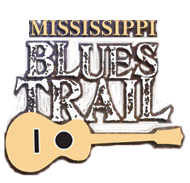Blues Deejays
Blues Deejays - Greenwood
Radio disc jockeys played a major role in the spread of the blues, boosting the careers of local artists, introducing listeners to performers from across the country, and more generally serving as a voice for the community. Early African American deejays in Mississippi include Early Wright, Bruce Payne, Charles Evers, Ike Turner, Sherman “Blues” Johnson, Jobie Martin, and Ruben Hughes, who began deejaying in Forest in 1957 at age sixteen and became the owner-operator of Greenwood’s WGNL in 1988.
The disc jockey (or “deejay”) format did not become the primary mode of programming music on radio stations until the 1940s. In earlier years musicians usually performed live in the broadcast studios, and the musicians’ union did not want its members to be replaced by recordings. Exorbitant fees charged by ASCAP, the major collection agency for publishers of mainstream popular music, led many stations to program music not controlled by ASCAP, especially blues, R&B, and country music, after World War II, when numerous new radio stations were licensed in Mississippi and across the country. The new stations sought to differentiate themselves, and one way was through featuring disc jockeys with colorful personalities and monikers who selected their playlists and read ads and announcements. The deejay format is often credited to Jack L. Cooper, an African American who began playing records on the air in the early 1930s on Chicago’s WSBC, after debuting his “All-Negro Hour” with live music there in 1929.
In 1949 Memphis’ WDIA became the first station to feature all-African American programming, while other stations began airing African American specialty shows as part of diverse program schedules. Pioneering African American disc jockeys in Mississippi included William “Dr. Daddy O’ Harvey (WJDX, Jackson), Early Wright (WROX, Clarksdale), Charles Evers (WHOC, Philadelphia), Jerome Stampley (WQBC, Vicksburg), Bruce Payne (WVIM, Vicksburg), and Sherman “Blues” Johnson (WTOK, Meridian). In 1954 Jackson’s WOKJ became the first station in the state to adopt an all-African American format . Its deejays included Harvey, Payne, Wade “Poppa Rock” Graves, and Jobie Martin (“The Loud Mouth of the South”). Other popular deejays were Lee Arthur “House Rocker” Rhodes in Meridian (WOKK), Ike Turner in Clarksdale (WROX), and Rockin’ Ed Williams in Greenville (WESY). Native Mississippians who found success as disc jockeys elsewhere included WDIA’s B. B. King and Rufus Thomas; Chicagoans Al Benson, Pervis Spann, Lucky Cordell, and Bill Tyson; James “Okey Dokey” Smith in New Orleans; and Big Ike Darby in Mobile. Deejays were often also active in concert promotion, artist management, or the record business.
Ruben Hughes, who worked as a deejay and promoter both in and out of the state, began hosting a blues show over WMAG his native Forest in 1957. He later worked at WQIC in Meridian and at stations in Mobile, Houston, Chicago, and Memphis. In 1969 Hughes, Vernon Floyd, and Robert Floyd started the first African American-owned station in the state, Hattiesburg’s WORV. In 1988 he purchased WGNL in Greenwood and built it into one of the most powerful stations in the Delta, featuring “Oldies, R&B, & Blues,” gospel and community programming.
Captions
Bruce Payne (1930-2005), once billed as “The Jet Pilot of Jive,” later worked as a gospel deejay at WOKJ in Jackson.
Ruben Hughes worked extensively as a concert promoter in Meridian, Greenwood, and other cities, presenting shows by Muddy Waters, Little Walter, B.B. King, Bobby Bland, James Brown, Tyrone Davis, and others.
Sherman “Blues” Johnson (1925-1982), a deejay at WQIC and WTOK in Meridian, also recorded as a vocalist for Trumpet Records and other labels. Ruben Hughes once worked for Johnson at WQIC.
Big Ike Darby (1929-1988), who was born in Leake County, became Mobile’s most prominent blues figure as adeejay and recording artist. He managed (and married) soul-blues singer Lynn White.
In the years before many African Americans had been hired by radio stations, blues shows targeting black listeners were hosted by white deejays such as “The Ole Hep Cat” on WRBC in Jackson.Woodson Wall was the original “Ole Hep Cat” and was replaced by Richard “Dick” Miller.
Bill Tyson (1935-1995), a native of Sunnyside, began his radio career at WGRM in Greenwood and later workedat WDIA in Memphis, WSSD in Chicago, and other stations. He managed bluesman Jimmy Reed in the 1970s.
content © Mississippi Blues Commission
[ BACK TO TOP ]

